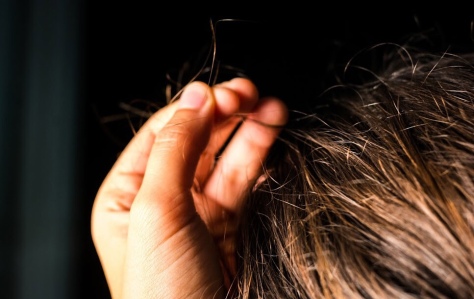
A great overview of trichotillomania provided by the Trichotillomania Learning Center (TLC)
http://www.bfrb.org/learn-about-bfrbs/trichotillomania
What is Trichotillomania?
For an in-depth of overview of treatment guidelines and considerations for trichotillomania, download our free booklet, Experts Consensus Treatment Guidelines
Trichotillomania (trick-o-till-o-may-nee-uh) (TTM or “trich”), also known as Hair Pulling Disorder, is characterized by the repetitive pulling out of one’s hair. Trichotillomania is one of a group of behaviors known as Body-Focused Repetitive Behaviors (BFRBs), self-grooming behaviors in which individuals pull, pick, scrape, or bite their hair, skin, or nails, resulting in damage to the body.

Research indicates that about 1 or 2 in 50 people experience trichotillomania in their lifetime. It usually begins in late childhood/early puberty. In childhood, it occurs about equally in boys and girls. By adulthood, 80-90% of reported cases are women. Hair pulling varies greatly in its severity, location on the body, and response to treatment. Without treatment, trichotillomania tends to be a chronic condition; that may come and go throughout a lifetime.
Signs & Symptoms
Trichotillomania is currently classified as an “Obsessive Compulsive and Related Disorder” in the Diagnostic and Statistical Manual of Mental Disorders, Fifth Edition.
The DSM-5 diagnostic criteria include:
Recurrent hair pulling, resulting in hair loss
Repeated attempts to decrease or stop the behavior
Clinically significant distress or impairment in social, occupational, or other area of functioning
Not due to substance abuse or a medical condition (e.g., dermatological condition)
Not better accounted for by another psychiatric disorder

Hair pulling may occur across a variety of settings and both sedentary and active activities. There are times when pulling occurs in a goal-directed manner and also in an automatic manner in which the individual is less aware. Many individuals report noticeable sensations before, during, and after pulling. A wide range of emotions, spanning from boredom to anxiety, frustration, and depression can affect hair pulling, as can thoughts, beliefs, and values.
Although the severity of hair pulling varies widely, many people with trichotillomania have noticeable hair loss, which they attempt to camouflage. Thinning or bald spots on the head may be covered with hairstyles, scarves, wigs, or makeup. Those with missing eyelashes, eyebrows, or body hair, may attempt to camouflage with makeup, clothing, or other means of concealing affected areas.
Due to shame and embarrassment, individuals not only try to cover up the effects of trichotillomania, but may avoid activities and social situations which may lead them to feel vulnerable to being “discovered” (such as windy weather, going to the beach, swimming, doctor’s visits, hair salon appointments, childhood sleepovers, readying for bed in a lighted area, and intimacy).
Impact and Effects
For some people, trichotillomania is a mild problem, merely a frustration. But for many, shame and embarrassment about hair pulling causes painful isolation and results in a great deal of emotional distress, placing them at risk for a co-occurring psychiatric disorder, such as a mood or anxiety disorder. Hair pulling can lead to great tension and strained relationships with family members and friends. Family members may need professional help in coping with this problem.
Physical effects such as pruritus, tissue damage, infection, and repetitive motion injuries to the muscles or joints are not uncommon. Those who ingest the pulled hair or parts thereof may experience gastrointestinal distress or develop a trichobezoar (hairball in the intestines or stomach), which could lead to gastrointestinal blockage and require surgical removal. Although trichobezoars are rare, they are a serious risk for those who ingest hair.
Keep reading
How are body-focused repetitive behaviors treated?



















